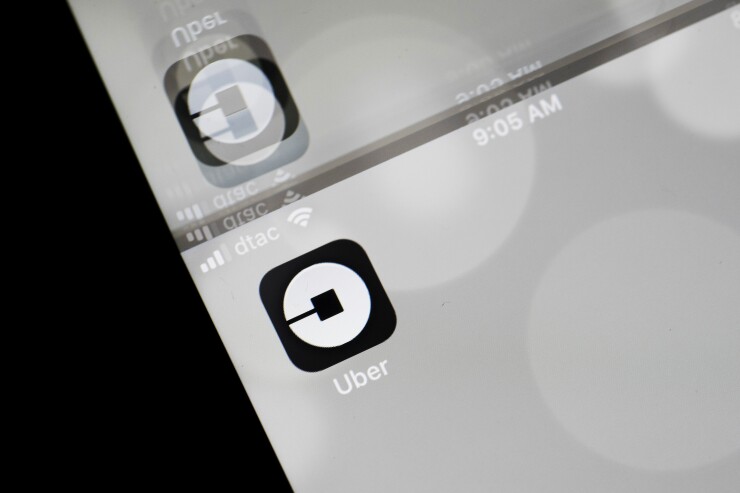The information you need to start your day, from PaymentsSource and around the web:
Shot in the arm
PayPal and Uber are providing free or discounted rides to coronavirus vaccination sites in an attempt to remove transportation as a barrier.
In addition to a $5 million donation, PayPal and Uber will determine how PayPal's charitable payment rails can be used to support a campaign for consumers who wish to donate to the two companies' vaccine program. Walgreens is also part of the Uber/PayPal initiative, which is focused on boosting immunizations in underserved communities.
The partnership initially focuses on the U.S., though there is room to expand internationally. PayPal's donation platform supports payments for more than 600,000 nonprofits and a global network of more than 377 million consumers.

Mc voice assistant
McDonald's is deploying a new fast food model to include computerized "staff" to receive ordering, and AI technology that bases recommendations on factors such as the regional popularity of certain foods.
The system, which will initially be tested in suburban Chicago, will accept contactless payments. McDonald's expects the technology will recognize voices better than human drivethru staff, who often can't hear orders well during high volume, reports
Several other
Dropping a clue
Mastercard presented its
It seems unlikely the card brand will support bitcoin. Mastercard Vice Chair Ann Cairns at a financial conference said bitcoin doesn't behave like a payment instrument, and is too volatile, reports
Cairns instead said bitcoin was more similar to gold, which is primarily an asset class instead of a widely used payment method.
Coding
Australian debit scheme Eftpos has released the details of a national QR code payment network that will support online, mobile and in-person transactions.
The network will start pilot tests by mid-year with full rollout expected by the middle of 2022, reports
Eftpos expects the project to go smoothly because QR codes are part of coronavirus screens in Australia, creating a familiarity with the technology.
From the web
THE WALL STREET JOURNAL | Sunday, February 28, 2021
Traditional retail chains like Macy’s Inc. that derive much of their income from shoppers who pay with a store credit card are making room for a less-lucrative customer: buy now, pay later.
REUTERS | Monday, March 1, 2021
Swedish payments firm Klarna nearly tripled its valuation to $31 billion in less than six months after it announced on Monday a new $1 billion fundraising round.
REUTERS | Monday, March 1, 2021
Britain's multi-billion pound supermarket industry is placing its bets on whether big-spending older shoppers will stick with buying their groceries online when months of lockdown end.
More from PaymentsSource
For many years, PaymentsSource’s Most Influential Women in Payments has been celebrating top-performing senior executives. Now we invite you to take part in a new opportunity to advance the mission of gender parity.
The council plays a critical role ensuring technology meets robust security needs as fraud risks rise, says MYPINPAD's Justin Pike.
Supermarkets and restaurants were already starting to go digital when the pandemic pushed hard on the gas. Expect more mobile and virtual experiences —and much less space for sit-down dining.
The U.K. should overhaul its stock listing rules and visa requirements to help the country’s fast-growing fintech industry compete after Brexit, a government-backed review has found.
More people are joining the gig economy, and a major driver of this trend — particularly for those working multiple gigs — is a need for faster access to cash to meet expenses.
New payment methods such as real-time payments, initiatives such as open banking, and technologies like biometrics, all contribute to a constantly evolving ecosystem. The potential for innovation and optimization is clear.
With mobile payments and banking apps on the rise, biometric authentication is now increasingly common in consumer finance, says Fingerprints' Michel Roig.
The COVID-19 pandemic led many locked-down consumers to stream or download more movies and video games, and this trend is leading to a rise in demand for faster data services such as 5G — a potential driver of payments innovation.
Affirm has taken its buy now/pay later model a step further by introducing a debit card that lets shoppers use installment payments for any purchase from any merchant.
Private equity firm Advent International is merging portfolio companies Transaction Services Group and Clearent, paving the way to another payments giant.
Taking a page out of the person-to-person money transfer model, health care payments software provider Waystar has added a text messaging option for patients to pay their bills.
Compliance officers have long been among the first to flag suspicious financial activity, but increasing activity on digital payments and banking platforms has created additional responsibility on an organization’s compliance team to root out criminal behavior.
The payments division of Western Union has integrated with the Swift Global Payment Initiative for faster transfers, and has added international currency options.





